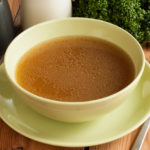Holiday Eating Strategy # 3: Satiety Through Scent
Food that tastes good or food that tastes bland; which would you prefer?
Kind of a silly question, of course, but it emphasizes the importance of the impact the flavor of a meal has with regard to how enjoyable it is.
Strictly from a health standpoint, there is absolutely nothing wrong with eating a broiled, skin-chicken thigh with nothing on it, along with some raw, shredded kale.
Protein? Check. Fat? Check. Fibrous, low glycemic carb? Check.
But flavor… well, not so much.
Eating is a multisensory experience.
It’s not just about fueling the body the way we fuel our cars; if it were, I could envision a scenario in which we all just drank an infusion of calories or swallowed a pill of some sort.
And in particular, during this festive time of year when temptations abound for many, tuning in to flavors becomes even more important, but perhaps not as important as another one of our senses: smell.
The holidays are nostalgic and although we may intuitively think that eating a slice (or more) of the apple pie you made using your dearly departed grandma’s recipe is the only way to finish off your holiday meal without feeling deprived, there are a few other things to consider.
Like hearing (those Christmas tunes)… and even more importantly, smelling.
When we compare these three senses, it turns out that taste isn’t what takes us down memory lane as much as smell does.
Smell in particular sparks a flurry of emotional memories[1].
After a smell enters the nose, it travels through the cranial nerve through the olfactory bulb, which helps the brain process smells. The olfactory bulb is part of the limbic system, the emotional center of the brain. As a member of the limbic system, the olfactory bulb can easily access the amygdala, which plays a role in emotional memories.
“Olfactory has a strong input into the amygdala, which process emotions. The kind of memories that it evokes are good and they are more powerful,” explained Howard Eichenbaum, director of the Laboratory of Cognitive Neurobiology at Boston University[2] in an interview with NBC News.
This close relationship between the olfactory and the amygdala is one of the reason odors cause a spark of nostalgia.
So where does taste fall into the spectrum?
Let’s just say our sense of taste isn’t as highly evolved in terms of its ability to conjure up memories of Christmas past.
Taste buds can differentiate between the five basic tastes: salty, sweet, sour, bitter, and umami (a savory taste found in foods like mushrooms or steak). While these are important building blocks for our understanding of flavor, eating would be pretty boring if we could only pick up on five varieties of food[3].
At Neuroscience 2014[4], top Chef Bryan Voltaggio offered a philosophy on cooking routed in brain function: Make original dishes that still carry all of the emotional weight of the classic foods used as inspiration, with the goal being to create a memorable experience, and one that connects the diner to a time, or a place, or a memory.
If we consider that smell’s role in flavor is the reason that food has such a strong potential for calling up memories, it would make sense from a rational perspective, then, to focus on the aromas that bring us back to holidays of times past much more so than taste.
While it might sound like nothing more than a trivial diet tip from a gossip magazine (ie: just smell a box of chocolate…don’t eat it), there’s actually some credibility to the concept.
Historically, we can refer to Proust’s In Search of Lost Time (French: À la recherché du temps perdu[5])—also translated as Remembrance of Things Past in which the scent, not the taste, of madeleines took him back to his youth,
Enjoy the foods that that make you feel energized, focused and fit into your healthy macronutrient balance… and for that trip down memory lane without consequence, smell that spiced cider, the gingerbread cookies your aunt is baking fresh in her oven or even grandma’s apple pie.
You’ll get more than a bang for your buck without falling off your balanced nutritional plan and never have to swallow even a spoonful of sugar!
[1] Holohan, Megan. “Smells like Nostalgia: Why Do Scents Bring Back Memories? – NBC News.” NBC News. NBC News, 12 July 2012. Web. 10 Dec. 2015
[2] http://www.bu.edu/cogneuro/
[3] “Savor the Moment: The Peculiar Connection Between Taste and Memory.” BrainFacts.org. BrainFacts.org, n.d. Web
[4] https://www.sfn.org/annual-meeting/neuroscience-2014
[5] Proust, Marcel, C. K. Scott-Moncrieff, Terence Kilmartin, and D. J. Enright. In Search of Lost Time. New York: Modern Library, 1992. Print





